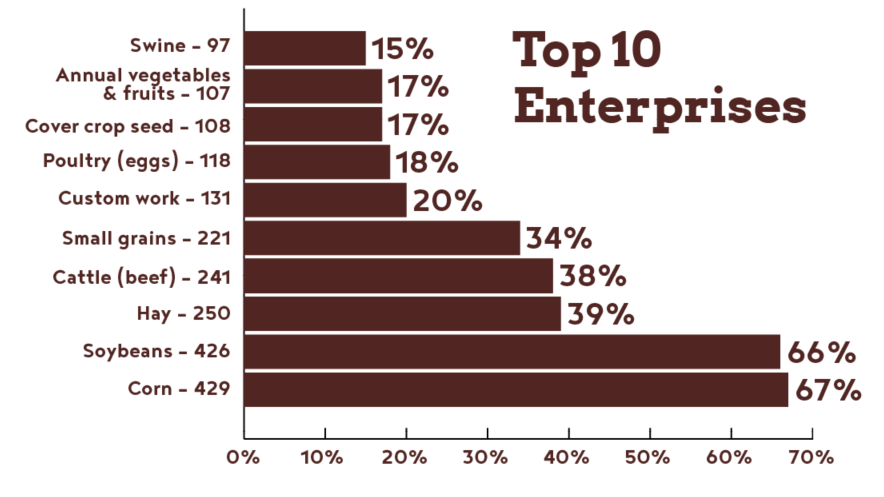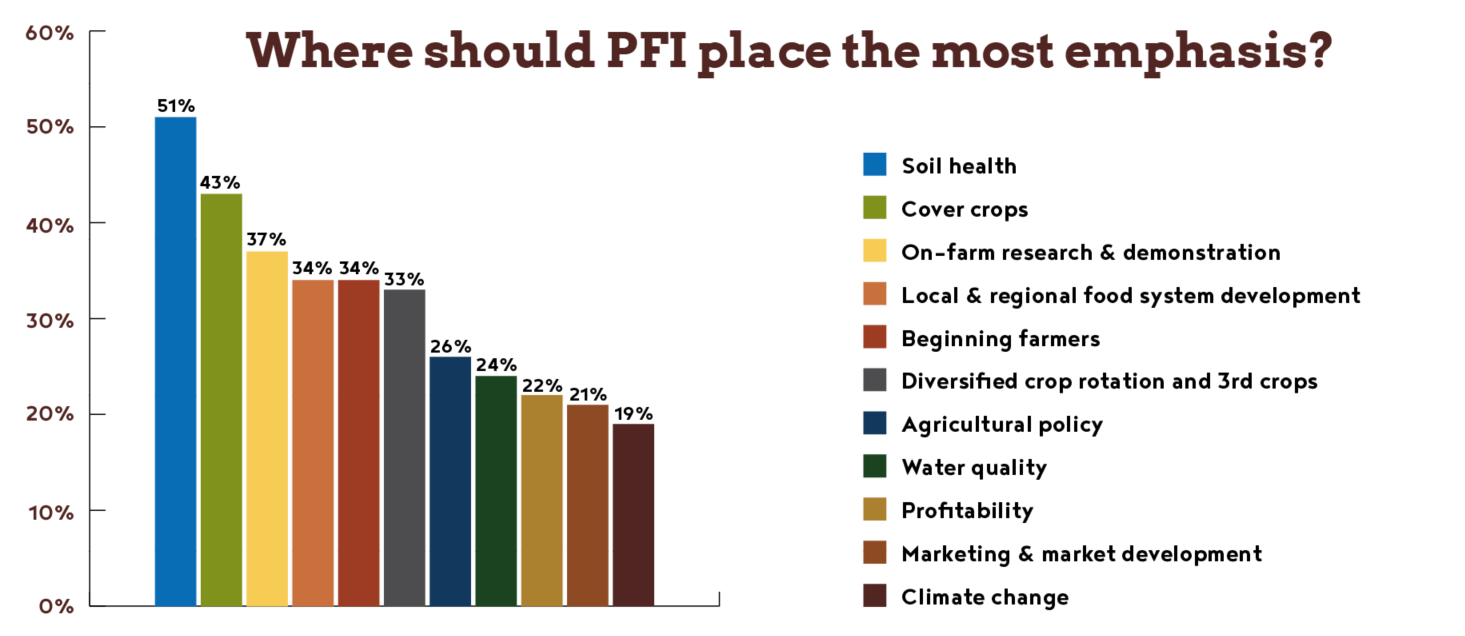A Bird’s-Eye View
Data from our recent member survey, sent every three years, offers a wealth of insights about our members and their priorities.
In early 2023, more than 1,000 households from the Practical Farmers of Iowa membership completed our member survey, which we send once every three years. The responses represent over a third of our membership at the time. The project is always a huge undertaking for the membership team, and a notable time commitment from our members. So, what did we learn?
Strongly Farmer-Led
I wish I could talk with each of our now 7,500-plus members to learn what they’re up to and why they’re a PFI member. Since that isn’t possible, I get pretty excited when it’s time to analyze our member survey information. It’s a special chance to learn about all the individuals who took the time to share feedback with us. I also get to see what our membership looks like – who you are and where you want to go – from a bird’s-eye view.
One of PFI’s core values is farmers leading the exchange of experience and knowledge. We enact this value in a range of ways, but it starts with having a strong base of farmers in our network. The survey results back this up: in 2023, 67% of our membership actively farmed. That number jumps to 84% if we factor in farmland owners who aren’t actively farming and those who aspire to farm.
The remaining 16% of members play a vital role supporting our farmer-led work. In their responses, they shared two primary reasons for being members: “concern for agricultural issues in Iowa” and a desire “to financially support the work that PFI does.” Those in this group are also our most ardent PFI magazine readers (though nearly everyone reports reading the magazine), and our most vocal advocates.
Purposeful Growth
Part of my member survey analysis includes digging through old member survey data, magazine articles and annual meeting minutes from the early days to see how we’ve stayed true to our mission and how we’ve changed based on members’ interests.
Our broad coalition of non-farmers, farmers, Iowans and non-Iowans is one example of how we’ve evolved. In PFI’s early days, only those who lived in Iowa and gained “a significant part of their income directly from farming” were eligible to be regular voting members, according to PFI’s annual meeting publications from the 1980s. While we’re still strongly farmer-led, I’m glad we now welcome non-farmers. I’m also glad we’ve broadened our geographic focus to include surrounding states. Currently, 23% of our members live outside of Iowa and represent 41 additional states.
The survey data also reveals shifts in farm income satisfaction. For instance, while only a third of members reported earning 81-100% of their household income from the farm, 76% still said they met their farm income goal in the past year. That’s a significant jump from our last member survey in 2020, when only about 50% of members said they’d met their income goal. This may seem puzzling, but these statistics partly reflect the nature of agriculture today. They may also indicate that many of our farmer-members don’t expect to earn their entire household income from the farm. I think PFI’s founders would be OK with us offering full membership privileges to those who live outside of Iowa, and those who don’t make a significant part of their income from farming.
Other areas have remained steadfast member priorities across the years. On-farm research is one such area, and our member survey results consistently bear this out. In the latest survey, members again ranked on-farm research and demonstration as one of their top three priorities for PFI to focus on in the future.
Diverse, With Shared Goals
A 2011 article in the PFI magazine recapped that year’s member survey with the title “PFI Membership: Diverse Enterprises, Many Opinions.” I could confidently say the same thing about our membership 12 years later. Our field day and annual conference attendees reflect the diversity of people in our network – from enterprises and production practices to personal backgrounds, motivations and skillsets. Survey data this round showed 40 distinct enterprises represented on PFI farms.
Yet this diverse network shares a common interest in freely sharing experiences to help one another improve. The top reason farming members cite for being part of PFI is to learn how to better their farm. Many members also see conservation as integral to their operations. We learned this by asking about their top farm goal for the next five years. While these open-ended responses can be tricky to analyze and aggregate at the macro level, they help us understand the range of members’ individual priorities. We heard about goals related to work-life balance, farm financials, scaling up and marketing.
But what we heard most often were five-year goals related to both production and conservation. Our members largely think of these two areas as intertwined, and their goals focus on addressing both. This theme has endured throughout PFI’s existence.
Guidance for the Future
An important part of the survey is where members tell us what we can do differently. Most of the freeform feedback in this section was about our programming. You want to see our research program grow (and offered specific topic ideas). You suggested we increase our cost-share offerings, along with other financial assistance and education, and suggested new services we should offer. Ideas ranged from farmer health to machine sheds to local food development, and much more. Thank you for all of these ideas!
We also heard a lot of feedback on our big tent. Most comments encouraged us to continue our efforts to increase the diversity of our membership. Suggestions included reaching out to more underserved communities, recruiting more larger-scale commodity farmers and continuing to welcome a wide range of enterprises and production practices to meet the needs of a diverse set of farmers. A few members voiced concerns that our network has gotten too diverse, or that we’re focusing too much on diversity. This tension is not new to PFI. Similar differences of opinion emerged when horticulture farmers, non-farmers and out-of-state members joined. PFI is working diligently to add – not replace – seats at the table.
A noticeable group of comments was about our policy work. These individuals asked us to increase our policy work while remaining nonpartisan. For example, Keaton Krueger wrote, “I know the organization has stayed outside of the policy area for the most part. I think that may have to change, though. Current policy isn’t optimized to reward PFI-type farmers; the system is set to drive to consolidation. It doesn’t have to be this way.”
Other guidance ranged from advice on our communications (you’d like us to improve our website and become a bigger voice in the media) to continuing to work on partnering with others. It will be vital for us to strengthen partnerships so we can serve your diverse needs and continue to foster change. You also care about better knowing and connecting with our growing PFI staff. And not surprisingly, half a dozen of you asked for a shorter survey.
What you see in this article is only a snapshot of the insights you shared. We truly appreciate your time and feedback. THANK YOU for your leadership and guidance – it’s vital to our success and impact.
Steve Carlson is PFI’s membership and office manager. As part of his work overseeing membership matters, he leads PFI’s member survey process and data analysis.


